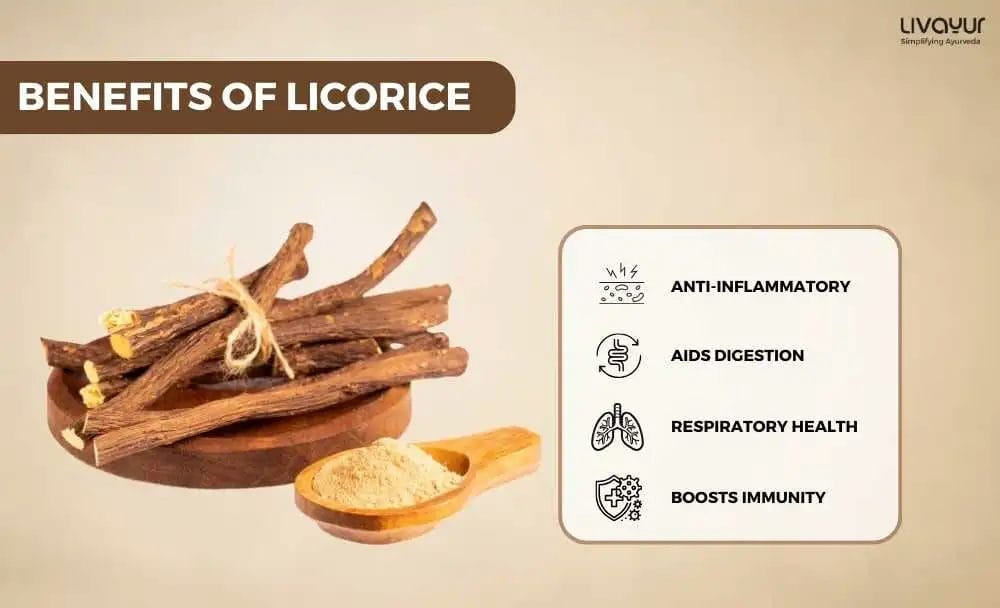
Licorice (Mulethi), scientifically known as Glycyrrhiza glabra, is a popular herb used in Ayurveda, the traditional system of medicine in India. Known for its sweet taste and distinctive flavor, licorice has been used for centuries for its various medicinal properties. In this article, we will explore the health benefits of Licorice, Licorice uses, licorice side effects, and more about licorice in Ayurveda, backed by scientific evidence.
Nutritional Value of Licorice Root
14 g of Licorice candy will contain the following nutrients. See the table below:
| Nutrients | Value |
| Calories | 53 |
| Carbohydrates | 13 g |
| Sodium | 7 mg |
| Sugar | 9.8 g |
| Fat | 0 g |
| Proteins | 0 g |
| Fiber | 0 g |
Benefits of Licorice for Health
Licorice is believed to have numerous health benefits and has been used in various Ayurvedic formulations for its medicinal properties. Some of the potential benefits of Licorice include:
1. Comes with Anti-inflammatory properties
Primary Benefits: Licorice contains compounds such as glycyrrhizin and glabridin that possess anti-inflammatory properties.[1], [2]
Secondary Benefits: This can help reduce inflammation in the body and may be beneficial in managing conditions such as arthritis and inflammatory skin conditions. [2]
2. Boosts Digestive Health
Primary Benefits: In Ayurveda, Licorice is believed to have digestive properties and is used to soothe the digestive system. [3], [4]
Secondary Benefits: It is known to stimulate the production of digestive enzymes, reduce acidity, and help in managing symptoms of indigestion, such as bloating and heartburn. [3], [4]
3. Promotes Respiratory Health
Primary Benefits: Licorice has been used in Ayurveda as an expectorant, which can help in managing respiratory conditions such as cough, cold, and bronchitis. [5]
Secondary Benefits: It is believed to help clear respiratory passages and relieve congestion. [5]
4. Offers Immune System Support
Primary Benefits: Licorice has been traditionally used in Ayurveda for its immune-boosting properties. [6]
Secondary Benefits: It is believed to stimulate the production of antibodies, enhance the activity of immune cells, and help in strengthening the immune system. [6]
5. Offers Protection against Cancer
Primary Benefits: Licorice root extracts have shown results against malignancy and proliferation of cancer cells.
Secondary Benefits: Isoangustone A, a unique flavonoid compound in licorice can affect unregulated cancer cell cycle and apoptosis, suppressing the growth of malignant tumors. [17]
Uses of Licorice
Licorice is used in various forms in Ayurveda, including as a powder, decoction, or as an ingredient in Ayurvedic formulations. Some common uses of Licorice include:
Digestive aid: Licorice is used in Ayurveda to support healthy digestion. It is believed to help reduce acidity, soothe the digestive system, and stimulate the production of digestive enzymes. [3]
For respiratory health: The roots and flowers of the Licorice plants are especially used to manage respiratory conditions such as cough, cold, and bronchitis. It is believed to help clear respiratory passages and relieve congestion. [7]
Skincare: Licorice is used in cosmetic skincare formulations for its anti-inflammatory properties. It is believed to help soothe and calm irritated skin, reduce redness, and manage skin conditions such as eczema and dermatitis. [8]
As a Component in Ayurvedic Formulations: Licorice is often used as a key ingredient in many Ayurvedic formulations, such as churnas (herbal powders), rasayanas (rejuvenating tonics), and lehyams (herbal jams). It is believed to enhance the therapeutic properties of other herbs and promote their synergistic effects. [9] [10] [11]
How to use Licorice?
To get the therapeutic benefits from Licorice, you may use the root in the following ways:
- As licorice capsules, candies or chewable tablets
- As licorice tea made by steeping the loose herbal extracts in hot water
- As liquid licorice by adding it to your beverages
- By mixing the herb in gels and creams for topical application
Licorice Side Effects
While Licorice is generally considered safe for short-term use, it is important to note that prolonged or excessive use of Licorice can have potential side effects. Some of the possible side effects of Licorice include:
- Hypertension: Licorice contains glycyrrhizin, a compound that can increase blood pressure when consumed in large amounts or for a prolonged period. It is important to use Licorice in moderation and consult a qualified Ayurvedic practitioner for appropriate dosage and duration of use, as excessive intake of Licorice may lead to hypertension or aggravate existing high blood pressure. [12] [15]
- Potassium imbalance: Licorice can cause an imbalance in potassium levels in the body. Prolonged use of Licorice can lead to low potassium levels, also known as hypokalemia, which can result in symptoms such as muscle weakness, fatigue, and irregular heartbeats. [13] [15]
- Interactions with medications: Licorice may interact with certain medications, including diuretics, corticosteroids, cardiovascular drugs, oral contraceptive pills, blood thinners, and many more. It is important to consult a qualified Ayurvedic practitioner or healthcare provider before using Licorice if you are taking any medications to avoid potential interactions. [14]
Precautions to keep in mind [15]
- Patients of hypertension should avoid taking licorice as the compound glycyrrhizin in the herb may cause a sudden increase in blood pressure, and may even lead to strokes.
- Females with a history of hormonal imbalances and hormone-sensitive malignancies such as ovarian cancer, breast cancer, etc should avoid taking licorice. Even pregnant women and breastfeeding mothers should stay away from the herb to rule out the possibility of adverse side effects.
- Patients for whom the gastrointestinal transit is quite prolonged should avoid taking the herb as they tend to be highly sensitive to glycyrrhizin.
- Aged people too should avoid taking licorice as the herb may lead to toxicity for this group.
- Studies show that the herb can cause a sharp drop in potassium levels which can seriously impact one’s cardiac health. Therefore, heart patients too should stay away from the herb.
- Patients with the eating disorder, anorexia nervosa must avoid licorice as they may fall prey to toxicity.
FAQs
1. Can I consume Licorice daily for its health benefits?
While Licorice is considered safe for short-term use in Ayurvedic doses, prolonged or excessive use of Licorice can have potential side effects such as hypertension, potassium imbalance, and hormonal imbalances. It is important to use Licorice in moderation and under the guidance of a qualified Ayurvedic practitioner to avoid any adverse effects.
2. What should be the normal dose of licorice?
The normal dose of licorice varies depending on the type of licorice preparation being used and the disease for which it is being used. If dried licorice root powder is being used to treat asthma, the daily recommended dosage is 1.0 g- 5.0 g, thrice a day. In the case of licorice tincture for asthma, the recommended dose is 2 ml to 5 ml thrice a day. If gastroesophageal reflux disease is being treated with the help of licorice, two tablets of 380 MG can be taken per day before meals. [16]
3. Can Licorice be used for skin care in Ayurveda?
Yes, Licorice is used in Ayurvedic skincare formulations for its anti-inflammatory properties. It is believed to help soothe and calm irritated skin, reduce redness, and manage skin conditions such as eczema and dermatitis.
4. Can licorice cause hormonal imbalances in women?
Yes, Licorice contains glycyrrhizin, which has estrogen-like effects and can disrupt hormonal balance, especially in women. Prolonged use of Licorice may result in hormonal imbalances, leading to menstrual irregularities or other hormonal issues.
5. In what products is licorice commercially used?
Licorice extracts are commercially used in various products such as artificial sweeteners, chewing gums, chewing tobacco, cigarettes, smoking mixes, diet gums, cough syrups, sore throat pearls, candies, toffees, cakes, chocolates, soft drinks, and hard drinks. Also, licorice extracts are used in many cosmetic products. [16]
Conclusion
Licorice, a popular herb in Ayurveda, has been traditionally used for its various health benefits. It is believed to have anti-inflammatory, digestive, respiratory, and immune-boosting properties. However, it is important to use Licorice in moderation and under the guidance of a qualified Ayurvedic practitioner, as excessive or prolonged use may lead to potential side effects such as hypertension, potassium imbalance, hormonal imbalances, or interactions with medications. As with any herbal remedy, it is recommended to consult a healthcare provider before adding Licorice or any other herbal supplement to your routine, especially if you have any pre-existing health conditions or are taking medications.
Disclaimer:
This article is for general knowledge only and does not constitute medical advice. Consult a trained medical professional before initiating any treatment or changes in your lifestyle
References:
- Licorice (Glycyrrhiza glabra Linn) As a Valuable Medicinal Plant (researchgate.net)
- The inhibitory effect of glabridin from Licorice extracts on melanogenesis and inflammation – PubMed (nih.gov)
- Gut health benefits of Licorice and its flavonoids as dietary supplements – ScienceDirect
- The anti-inflammatory activity of Licorice, a widely used Chinese herb (researchgate.net)
- Water extract of Licorice had anti-viral activity against human respiratory syncytial virus in human respiratory tract cell lines – ScienceDirect
- Effects of glycyrrhizin on immune-mediated cytotoxicity
- Phytochemical-Constituents-and-Pharmacological-Effects-of-Liquorice-A-Review.pdf (researchgate.net)
- Cosmetics | Free Full-Text | Main Benefits and Applicability of Plant Extracts in Skin Care Products (mdpi.com)
- Role of Ayurveda in Paediatric Atopic Dermatitis – A Case Study (researchgate.net)
- Effect Of Yashtimadhu (Glycyrrhiza Glabra) Churna Mukhalepa With Honey As An Upakrama Of Dinacharya (Daily Regimen Practice) W.S.R. To Varnya (Complexion) | International Journal of Ayurveda and Pharma Research (ijaprs.com)
- Review Of Yashtimadhu On Mental Health W.S.R To Medhya Rasayana
- Licorice-Induced Hypertension and Syndromes of Apparent Mineralocorticoid Excess – ScienceDirect
- A Review On Yashtimadhu (Glycyrrhiza Glabra) – An Excellent Medicinal Plant For The Future
- Liquorice- drug interactions
- Licorice abuse: time to send a warning message
- Glycyrrhiza glabra (Licorice): A Comprehensive Review on Its Phytochemistry, Biological Activities, Clinical Evidence and Toxicology
- Chemopreventive Effects of Licorice and Its Components


















